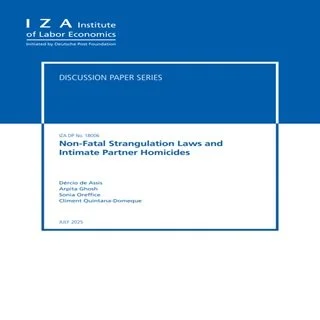Non-Fatal Strangulation Laws and Intimate Partner Homicides
By Dércio de Assis, Arpita Ghosh, Sonia Oreffice, Climent Quintana-Domeque
Do non-fatal strangulation laws save lives? Non-fatal strangulation (NFS) is a common and dangerous form of intimate partner violence (IPV) and a predictor of homicide, yet it was historically neglected by the criminal justice system. Since the year 2000, most U.S. states have enacted laws enlisting NFS as a standalone criminal offense. We compile a novel dataset on state NFS statutes and link it to the FBI Supplementary Homicide Reports from 1990 to 2019 to estimate the causal effects of these laws on IPH rates. Using a difference-in-differences strategy, and an estimator that accounts for staggered adoption and treatment heterogeneity, we find that NFS laws led to significant reductions in IPH rates. We estimate that these laws reduce female-victim IPH by 14% and male-victim IPH by 36%, among victims aged 18-34. No significant effects are observed for victims 50 and above or for homicides committed by strangers. Event-study estimates support the parallel trends assumption. Our findings suggest that NFS laws can disrupt the escalation of IPV and reduce lethal outcomes.
IZA DP No. 18006 Bonn: IZA – Institute of Labor Economics, 2025. 61p.


